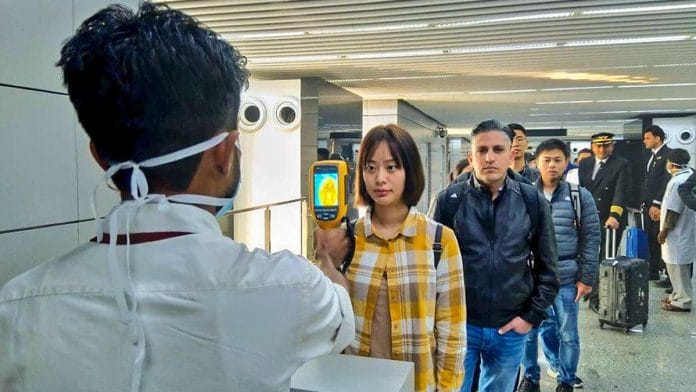Beijing/London: China’s death toll from the coronavirus climbed as the country extended the Lunar New Year holiday amid government reports that the infection’s spread was accelerating and a surge of new cases emerged around the globe.
President Xi Jinping’s government is under pressure to combat an epidemic that shows little sign of slowing down. There are 2,744 confirmed cases on the mainland, the National Health Commission said Monday. Deaths in the country climbed to 80 from just two a week ago, as Hubei province announce 24 additional fatalities.
Anxiety is growing amid evidence that the disease has an incubation period of about two weeks before infected people start to show symptoms. That raises the possibility that people carrying the virus but don’t show symptoms could infect others.
The sell-off that dominated U.S. equity markets on Friday continued Monday in Asia. Japanese shares tumbled along with U.S. futures and crude oil, while the yen jumped in early trading.
Chinese authorities on Sunday said the virus isn’t yet under control despite aggressive steps by authorities to limit movement for millions of people who live in cities near the center of the outbreak.
China extended the Lunar New Year break until Feb. 2 from Jan. 30 originally. Government officials are delaying the end of the year’s biggest holiday, when hundreds of millions of Chinese leave cities to return to their hometowns, to avoid having travelers contribute to the spread.
Also read: Coronavirus back in China — what you need to know about the virus and its deadly history
Mainland China accounts for 98% of confirmed global infections, while more than a dozen countries and territories reported the illness within their borders. The World Health Organization said of 29 patients with infections outside China, 26 traveled through Wuhan, epicenter of the outbreak.
Hong Kong officials announced the city would bar residents of Hubei Province, where Wuhan is based, from entering the former British colony after midnight local time on Sunday. The ban would also apply to anyone who had traveled to Hubei in the past 14 days. An exception would be made for Hong Kong residents, the statement said.
The U.S. consulate in Wuhan plans to evacuate some Americans in a charter flight on Tuesday, and other governments and companies have said they are prepared to help their people leave the city that’s under lockdown. France is seeking approval to repatriate its citizens by mid-week, the health minister said Sunday. Japan also plans to evacuate nationals who wish to leave Wuhan. About 550 Japanese are in Hubei province.
In Hong Kong, authorities halted plans to establish a possible quarantine center in the northern New Territories district of Fanling after protests by nearby residents and local councilors. In France, the organizers of a Chinese New Year parade in Paris scheduled for Sunday canceled the event due to virus fears.
More than 1,600 people will be sent to Wuhan over the next two days to assist in efforts to contain the spread. The Chinese government is banning all outgoing overseas group tours as of Monday after suspending domestic group tours last week.
Japan, Hong Kong, Thailand and South Korea had more confirmed cases on Sunday, while Canada announced its first case on Saturday. Taiwan confirmed a fourth case of a woman who had visited Wuhan during the New Year’s holiday and then traveled in Europe before being diagnosed on her return on Jan. 25.
The U.S. confirmed three cases within 24 hours: two in Southern California and one in Maricopa County, Arizona. All the patients had recently been in Wuhan and are hospitalized. Their close contacts are being monitored for signs that they may be developing the disease, the Centers for Disease Control and Prevention said Sunday. Washington state and Chicago earlier had confirmed infections.
“The U.S. has faced multiple pandemics before, of varying degrees of severity,” said Nancy Messonnier, director of the CDC’s National Center for Immunization and Respiratory Diseases. “We need to be preparing as if this is a pandemic, but I continue to hope that it is not.”
Also read: India is on alert as coronavirus spreads in Asia, seeks WHO advice
Scientists have been working to understand the virus better, how contagious it is and where it comes from. First detected in Wuhan last month, it has sparked fears that the disease could rival SARS, the pandemic that claimed almost 800 lives 17 years ago.
A clinical trial is under way using anti-HIV drugs ritonavir and lopinavir to treat cases of the new coronavirus, according to an article published in the Lancet medical journal Friday. Beijing’s municipal health commission said on Sunday the drugs made by AbbVie Inc. are part of the National Health Commission’s latest treatment plan, and its hospitals have supplies of the medicine if needed.
Symptoms of the virus include fever, cough or chest tightness, and difficulty breathing. It has an incubation period of about 14 days before the symptoms start to show, according to the CDC.
The virus is believed to have emerged last month in a seafood and wildlife market in Wuhan, spreading from infected animals to humans, and police have raided wildlife markets across eastern China.
China banned wildlife trade across the country, prohibiting the shipping and sale of wild animals and quarantining breeding sites, with the government warning against the consumption of wild animals.
China has made strides in monitoring and detecting infectious diseases since SARS and tightened controls on the sale of exotic animals, considered nourishing in some parts of the country. Yet the markets, which offer conditions that can set off potentially deadly contagions, remain popular and a central part of life in many cities throughout Asia.- Bloomberg
Also read: Indian embassy in China checking on health of Indians amid coronavirus spread: Jaishankar






